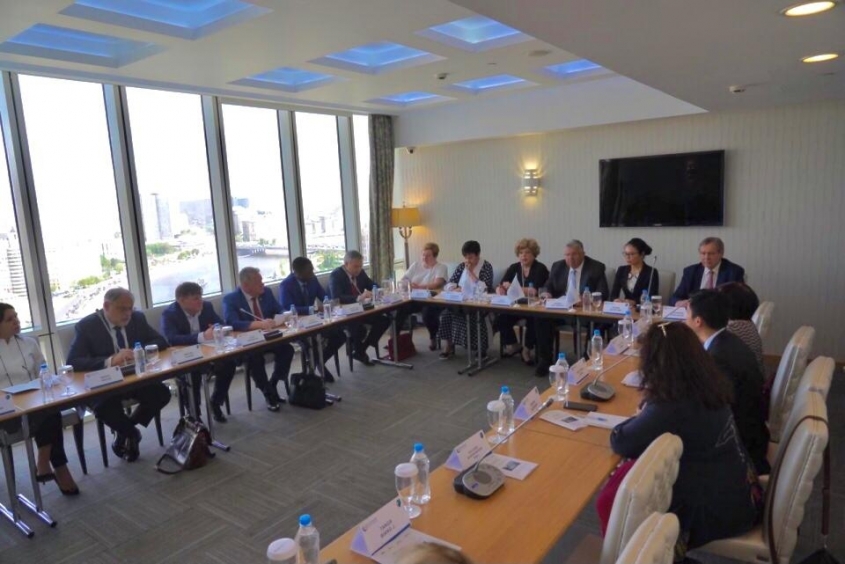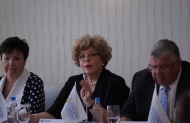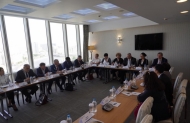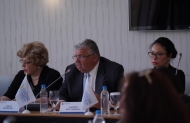
On May 8, 2021, the World Trade Centre hosted an Independent Dialogue "Different Routes, Similar Goals" in support of the UN Food Systems Summit, which will be held in November 2021. The event was organized by the Eurasian Peoples' Assembly.
The future UN Summit calls on all of humanity to work together to change the world patterns of production and consumption of food used, as well as attitude towards them. It is a “summit of solutions” that encourages everyone to act to change the global food system to a more efficient and sustainable one for everyone on Earth.
The upcoming Summit will bring together the most visible players from the worlds of science, business, politics, health and education, as well as farmers, representatives of indigenous peoples, youth organizations, consumer groups, eco-activists and other interested parties.
The Independent Dialogue "Different Routes, Similar Goals" was opened by the Secretary General of the Eurasian Peoples' Assembly Andrei Belyaninov, urging the participants to follow the Principles of interaction defined by the UN.
“The success of the 2021 Food Systems Summit depends on the active participation of representatives of a wide variety of actors, organizations, movements and initiatives. The Independent Dialogue in support of the Summit, organized by the Eurasian Peoples' Assembly, is an open platform for finding solutions to real problems,” - Belyaninov commented. “Listen to each other, explore both synergies and divergences, work together to identify promising courses of action, welcome different points of view, forge new connections.”
The Dialogue was welcomed by the Deputy Secretary General of the SCO (Shanghai Cooperation Organization) J. Saidamir, Charge d'Affaires of the Socialist Republic of Vietnam in the Russian Federation Nguyen Quynh Mai.
The office of Dr Agnes Kalibata, Special Envoy for the UN Food Systems Summit, sent her video greeting to the participants in the Independent Dialogue.
48 participants of the Independent Dialogue from Russia, Belarus, Kazakhstan, USA, Vietnam, Nigeria, South Africa, Malawi, Tunisia, Benin discussed a number of sensitive topics that caused a lively discussion.
Thus, economist Mikhail Khazin raised the topic, which then went through many speeches of the participants as a red line, namely: the development paradigm that has been operating in the world since the end of the 80-s of the last century “Model of constant market expansion” has largely outlived its usefulness.
The participants in the Dialogue in their speeches constantly referred to the need to revise the existing interaction standards, whose shortcomings were especially acute during the lockdowns associated with the COVID-19 pandemic.
In this regard, the participants in the Dialogue not only raised a number of problems, but also proposed important and diverse solutions to the tasks set.
Dr Richard Gilmore, Chair of the Global Food Safety Forum, outlined key strategic food safety challenges in a post-pandemic world, such as:
- managing surges in food demand without compromising consumer confidence;
- minimizing the possibility of a sharp increase in the number of reviews of food and feed;
- rebuilding supply chains, food safety oversight and regulatory compliance;
- the use of new technologies in the food segment (artificial intelligence) to protect human health;
- diversification of trade policies of countries by expanding the range of products, as well as increasing the number of sales models.
“We need a holistic, cultural shift approach with public and private recognition of the need for joint risk prevention and mitigation strategies,” - concluded Dr Gilmore. "Then we could look forward to the New Normal."
African colleagues who took part in the dialogue have repeatedly pointed to the need for integration in a variety of areas. They were supported by Member of the Board (Minister) for Integration and Macroeconomics of the Eurasian Economic Commission, Academician of the Russian Academy of Sciences Sergei Glazyev. In particular, he said that in the context of food supply, African countries are one of the most important partners of Russia.
The signed Memorandum of Cooperation between the EEC and the Union of African States made it possible to start work on a plan of measures for the development of integration processes. Russia's potential in this area was presented by the Chairman of the RF CCI Committee for the Development of the Agroindustrial Complex, Academician of the Russian Academy of Sciences Pyotr Chekmarev, reporting that 100 million hectares of arable land are being cultivated in Russia from the reserves available for the future.
One of the main topics of the Dialogue was the preservation of humanitarian values, which are inextricably linked with the implementation of the Sustainable Development Goals. Vice-President of the UNESCO International Bioethics Committee, Academician of the Russian Academy of Sciences, Chairman of the Russian National Bioethics Committee and the RAS Commission on Scientific Ethics, Alexander Chuchalin emphasized that the 21st century is the century of human vulnerability. In this regard, the academician outlined the need to search for ethical solutions when launching any programs and initiatives.
This topic was developed taking into account the experience of Vietnam by the former Deputy Minister of Foreign Affairs of the Socialist Republic of Vietnam, Chairman of the Union of Friendship Societies of Vietnam Nguyen Phyong Nga, who spoke about the system of social organizations in the Socialist Republic of Vietnam working in the sphere of achieving the Sustainable Development Goals.
“These organizations, built by people and for people, - emphasized Nguyen Phyong Nga, - have an organizational system from the central to the local level, penetrate deeply into the masses and provide assistance in all aspects of production, consumption, and environmental protection.”
The summarizing conclusion of the Goodwill Ambassador Alexandra Ochirova united different opinions and was accepted by all participants.
“I believe that the problem of food safty is one of the most important in the global agenda for sustainable development and concerns all countries and peoples, without exception, every person living on earth,” - concluded Alexandra Ochirova.
According to the Goodwill Ambassador, the global threats of hunger, poverty and disease existing today in many countries, on the one hand, and the vulnerability of methods of production and consumption of food in the world, on the other hand, as well as imperfect functioning of food systems, limited natural resources and other environmental problems require new protocols of interaction between all spheres of human activity.
Cooperation between states, peoples and public organizations is needed to reform the existing national and world food systems in order to remove the existing threats to education, health and the economy, to human rights, life and health, to peace and security in the world.
Practical decisions concerning all systemic changes in this area must proceed from the possibility of safe and sustainable development of man and society, the preservation of peoples and all of mankind. These decisions must be moral and responsible.








